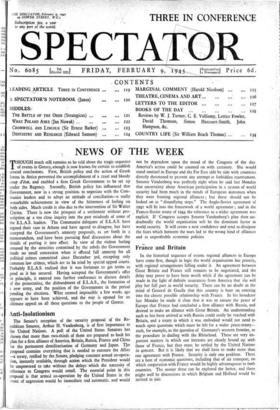Anti-Isolationism
The Senate's reception of the security proposal of the Republican Senator, Arthur H. Vandenberg, is of first importance to the United Nations. A poll of the United States Senators has shown that more than two-thirds of them are prepared to back his plan for a firm alliance of America, Britain, Russia, France and China for the permanent demilitarisation of Germany and Japan. The proposal contains everything that is needed to reassure the Allies —a treaty, ratified by the Senate, pledging constant armed co-operation, instantly available, through action which the President would be empowered to take without the delays which the necessity of reference to Congress would entail. The essential point in this Proposal is that armed co-operation by the United States in the event of aggression would be immediate and automatic, and would not be dependent upon the mood of the Congress of the day. America's action could be counted on with certainty. She would stand sentinel in Europe and the Far East side by side with countries directly threatened to prevent any attempt at forbidden rearmament. Senator Vandenberg was perfectly right when he said last Monday that uncertainty about American participation in a system of world security had been much in the minds of European statesmen when they were framing regional alliances ; but these should not be looked on as "disunifying steps." The Anglo-Soviet agreement of 1942 will fit into the framework of a world agreement; and in the Franco-Soviet treaty of 1944 the reference to a wider agreement was explicit. If Congress accepts Senator Vandenberg's plan then undoubtedly the world organisation will be the dominant factor in world security. It will create a new confidence and tend to dissipate the fears which between the wars led to the wrong kind of alliances and to unprofitable economic policies.






















